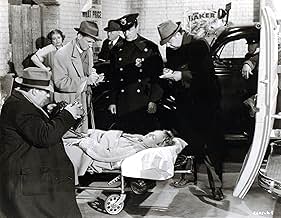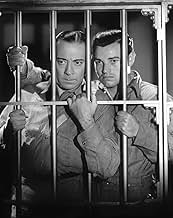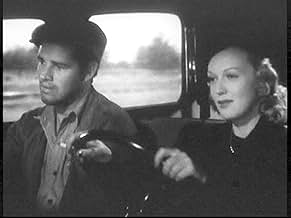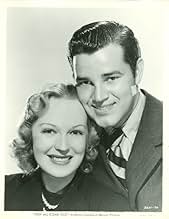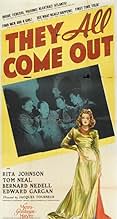Agrega una trama en tu idiomaA "Crime Doesn't Pay" morality drama about a young man sentenced to a prison term and attempts by the system to rehabilitate jailed criminals.A "Crime Doesn't Pay" morality drama about a young man sentenced to a prison term and attempts by the system to rehabilitate jailed criminals.A "Crime Doesn't Pay" morality drama about a young man sentenced to a prison term and attempts by the system to rehabilitate jailed criminals.
- Associate Warden
- (sin créditos)
- Assistant Cashier
- (sin créditos)
- Guard
- (sin créditos)
- Convict
- (sin créditos)
- Hughie
- (sin créditos)
- Federal Marshal
- (sin créditos)
Opiniones destacadas
PS...Dumb title. Sounds like a slogan for spot remover.
The problem with the film is its one-sided view of things. In the real world, every guard, warden and board member is not so altruistic or benign. And politics can interfere with good intentions. Still, it paints a picture of a model prison system that is worth keeping in mind.
The film also minimizes the extent to which anti-social inmates and their social structures make meaningful reform (of individuals) extremely difficult. In today's world, this film might be considered naïve.
But the concept of justice is at the heart of the film and it rings just as true today.
In fact this one too first was conceived to be a short documentary about federal prisons. In his interview given in 1964 to Simon Mizrahi, Tourneur describes complicated story of the making of the movie. First director went to Washington where he visited different prisons in order to film documentary. When the short film was ready, Louis B. Mayer saw it and asked Tourneur to add more 20 minutes of footage and turn it into something of a half-feature, as an experiment. At this time Tourneur in cooperation with John Higgins wrote a story, which became the story of the film, about a young man that goes out of jail and tries to re-enter normal life while his former friends prepare to commit another crime and drag him along. Tourneur filmed it and showed it to L. B. Mayer again, who end up liking it and asking director to add 1/2 hour more and turn it into feature film. Tourneur and Higgins had to put all their imagination to work in order to invent some new scenes and make movie longer. After seeing the film it was virtually impossible to understand that it went through these three stages in it´s making unless you knew all about it before. Quite an interesting early work from Jacques Tourneur, worth seeing for addicted movie buff only. 7/10
When the story begins, Joe (Tom Neal) is out of work and hungry. When he meets Kitty (Rita Johnson) he thinks his luck is improving, as she buys him some food and takes him with her on a cross-country drive. However, she works for Reno Madigan, a career criminal who runs a gang who robs banks. Soon, Joe is their driver and soon after that, the gang is captured.
The next portion of the story shows a very detailed account about how federal prisons operated back in the day. Much time in the film is spent showing how the prisoners are sorted according to their likelihood of being rehabilitated. Joe is a first-time offender, and they offer his job training and more. Reno, naturally, is NOT an ideal candidate and his behaviors soon result in his being sent to Alcatraz. But there's much more to it than this...as well as an exciting and satisfying finale.
Despite the film seeming a bit overly idealistic at times, it never is dull and first time director Jacques Tourneur did a great job with this B-movie. It also helped that despite being a B, the budget was bigger than usual and allowed for filming at various penitentiaries across the nation. Worth your time.
At first they live it up, but they are eventually captured. But not before Reno and Joe hide 33K in stolen loot but do not tell the others about it. The rest of the film is about how the federal prison system treats each one of the gang - even operating on Joe's hand and teaching him a trade. The lesson seems to be that the feds know who is redeemable and who isn't, and if you're not it's off to "The Rock" - Alcatraz. Before their capture, Joe and Kitty seem to have an understated romance going, and during their imprisonment they are allowed to write letters where this romance seems to blossom. But against them when they get out is their record, local papers looking for sensational stories, and then there is still Reno inside prison expecting Joe to help spring him with the 33K they hid. And Reno has friends on the outside.
I doubt that the federal prison system was ever that good, and even if it was, I doubt a prison psychiatrist could just talk a seemingly crazy man out of believing he had women in his pockets and cure him with talk alone.
imdb currently rates this as a 6/10, but knowing its roots as a short/documentary, I'd give it a 7/10. The leads give real depth to their rather rushed performances, and it is an interesting tale.
¿Sabías que…?
- TriviaThe original trailer for Almas que regresan (1939) claimed that it was the first to show the real truth about Alcatraz and other federal prisons. In fact, this started out as a four-reel documentary short on federal prisons. Louis B. Mayer asked shorts director Jacques Tourneur to expand the documentary. Mayer liked what he saw and ordered Tourneur to use the footage to create a feature film of fiction. This became Tourneur's first American feature film.
- ErroresTodas las entradas contienen spoilers
- Citas
[first lines]
Self - Former Attorney-General: You know, Jim, I've been thinking. You have one of the most interesting jobs in the whole Department of Justice. Here you are, in charge of twenty-eight federal prisons, and eighteen thousand prisoners. The people apparently have very little realization of that phase of our work. They don't seem to realize that every time a prison door opens, and a man goes in, another man comes out. That in a way is a challenge of the federal prison system. Some day, some how, all these prisoners come out, come back to live among us. Now, we've done a very great deal for these men, and it seems to me that the public ought to be told about it.
Self - Director of the Federal Bureau of Prisons: They should be told, but it's a big story, and it's a hard story to tell because every single case is different. Let's take a look at a typical case of interstate bandits...
[switches to the story of Reno Madigan's gang]
Selecciones populares
Detalles
- Fecha de lanzamiento
- País de origen
- Idioma
- También se conoce como
- They All Come Out
- Locaciones de filmación
- Chillicothe, Ohio, Estados Unidos(U.S. Industrial Reformatory)
- Productora
- Ver más créditos de la compañía en IMDbPro
- Tiempo de ejecución1 hora 10 minutos
- Color
- Relación de aspecto
- 1.37 : 1
Contribuir a esta página


